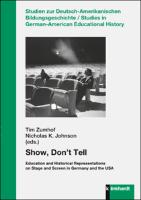Show, don't tell
Education and historical representations on stage and screen in Germany and the USA
Contributor(s)
Zumhof, Tim (editor)
Johnson, Nicholas K. (editor)
Language
EnglishAbstract
Demonstrating, representing, or showing is at the heart of every educational action. Historical representations on screen and stage do not "teach" us history but rather influence our ideas and interpretations of it. The contributions to this volume explore the depiction of history in theater and film from the intersection of historical scholarship, aesthetics, memory studies, and education. They examine the creation of historical images, film production and reception, the scriptwriting process, educational programming, and depictions of German-American encounters. Above all else, they explore how various theatrical and filmic productions show history rather than tell it. (DIPF/Orig.)
Keywords
Historical educational research, History, teaching history, Historical pedagogy, presentation of history, contemporary history, educational history, Awareness of history, Historical thinking, historical image, culture of history, media education, Media history, course of study, didactics, theatre, Film, Informal learning, influencing, Entertainment film, entertainment literature, Drama, representation, Media , International relations, Image of America, Picture of Germany, view , change of attitude, Fascism, Criticism of ideology, Historical novel, Literature, acting, theatrical play, Expressionism, Theatre pedagogy, Jew, Documentation, authenticity, collective memory, Holocaust, Persecution of Jews, Remembrance, staging, role playing, History lessons, Life-event research, Civil war, the learning process, teaching method, Historical learning, Film analysis, the film industry, globalisation, Contemporary literature, Historiographies, Western, Cinema, Critics, Film history, War film, World War II, National Socialism, film production, Lion Feuchtwanger, Peter Handke, Interview , 20th century, Germany, USA, Germany <until 1945>, Historische Bildungsforschung, Geschichte <Histor>, Geschichtsvermittlung, Historische Pädagogik, Geschichtsdarstellung, Zeitgeschichte, Bildungsgeschichte, Geschichtsbewusstsein, Historisches Denken, Geschichtsbild, Geschichtskultur, Medienpädagogik, Mediengeschichte, Studiengang, Didaktik, Theater, Film, Informelles Lernen, Beeinflussung, Unterhaltungsfilm, Unterhaltungsliteratur, Drama, Darstellung, Medien, Internationale Beziehungen, Amerikabild, Deutschlandbild, Einstellung <Psy>, Einstellungsänderung, Faschismus, Ideologiekritik, Historischer Roman, Literatur, Schauspiel, Theaterstück, Expressionismus, Theaterpädagogik, Jude, Dokumentation, Authentizität, Kollektives Gedächtnis, Holocaust, Judenverfolgung, Erinnerung, Inszenierung, Rollenspiel, Geschichtsunterricht, Life-Event-Forschung, Bürgerkrieg, Lernprozess, Lehrmethode, Historisches Lernen, Filmanalyse, Filmwirtschaft, Globalisierung, Gegenwartsliteratur, Historiografie, Western, Kino, Kritiker, Filmgeschichte, Kriegsfilm, Weltkrieg II, Nationalsozialismus, Filmproduktion, Feuchtwanger, Lion, Handke, Peter, Interview, 20. Jahrhundert, Deutschland, USA, Deutschland <bis 1945>DOI
10.35468/5828ISBN
9783781523975, 9783781558281Publisher
Verlag Julius KlinkhardtPublication date and place
Bad Heilbrunn, 2020Series
Studien zur Deutsch-Amerikanischen Bildungsgeschichte / Studies in German-American Educational History,Classification
History of education


 Download
Download Web Shop
Web Shop